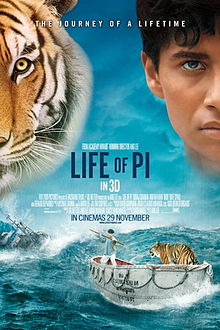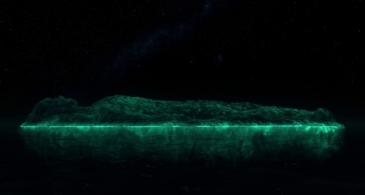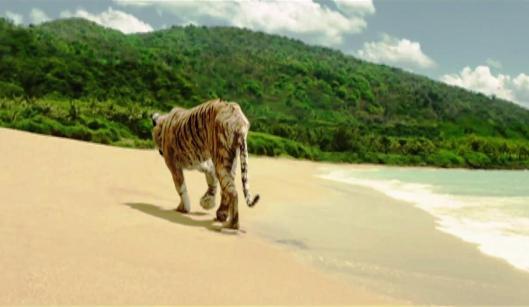Tags
books, carnivorous island, discussion, life, life of pi, movie, movies, religion, religious, richard parter, second story in life of pi, stories, symbolism, symbolism in life of pi, two stories in life of pi, what does the carnivorous island mean, writing, yann martel
Before I begin this little discussion, I will be discussing the movie Life of Pi and there will be spoilers. For those who have not read the book or seen the movie, it’s advised to not read this post further.
 So, what do I want to discuss in particular? The carnivorous island in Life of Pi.
So, what do I want to discuss in particular? The carnivorous island in Life of Pi.
I watched this movie when I was in The Netherlands in February earlier this year. Many months have passed and I didn’t have the urge to write a little discussion piece until now. My partner recently asked me what I thought the ‘carnivorous island’ meant in the second of the two stories told in Life of Pi.
For those who are familiar with the story, there are two stories. One which is rather fantastical and requires the audience to stretch their imagination. After the shipwreck of the boat that was taking Pi and his family to America, Pi finds himself on a boat with a collection of animals, one of which is the tiger, Richard Parker. The other animals die early on in the film and he has to survive along with a tiger for 227 days until the boat arrives on the shores of Mexico.
The second story he tells is where the animals on the boat represent different people. The orangutan, his mother. The hyena, the cook. The zebra, the Buddhist sailor. The tiger, Pi. The hyena kills the zebra first and then the orangutan (his mother). Where the tiger (Pi) soon kills the hyena.
I personally preferred the second, much darker story. Richard Parker (the tiger) representing Pi’s darker side as he seeks revenge for the death of his mother. The acting in the movie was also what gripped me during that scene. As a psychology student, maybe it was the idea of this fantastical story represents a darker, repressed trauma which appealed to me so much.
I left the cinema thinking on the events. It wasn’t until a few days ago that my partner asked me, ‘what do you think the carnivorous island symbolised, if anything?’ He had found a forum where they were discussing the topic. I was kinda shocked. I never thought about it. I loved the scene with the carnivorous island because it was so morbidly fascinating.
Even for those people who wanted to believe that the first story was the real one, where the animals were just animals and no murders were committed, it was nearly impossible for even THOSE people to accept the idea of a carnivorous island in the middle of no where. For those, like me, who believed in the darker tale, the island symbolised Pi eating the flesh of the corpses to survive. Whose corpse did he eat? In the movie (I haven’t read the book and I’m ashamed!), the island is in the shape of a person (woman?). Did he eat his own mother?
 It’s a ghastly thought and makes even me want to believe in the first fantastical story. But I’m also enthralled by how dark that subplot would be. Pi finds that someone had been consumed previously on this ‘island’. Pi doesn’t stay on that island for long and it’s from that point in the movie does he realise he must move on and find land. Does it symbolise losing oneself to madness? Dying out of shame? I like to think it’s when he realises that the darker side of him, Richard Parker, would consume him and send him into madness if he stayed in this sick state. What makes it ironic is that Pi had always a vegetarian, isn’t it a sick twist that he would eat human flesh?
It’s a ghastly thought and makes even me want to believe in the first fantastical story. But I’m also enthralled by how dark that subplot would be. Pi finds that someone had been consumed previously on this ‘island’. Pi doesn’t stay on that island for long and it’s from that point in the movie does he realise he must move on and find land. Does it symbolise losing oneself to madness? Dying out of shame? I like to think it’s when he realises that the darker side of him, Richard Parker, would consume him and send him into madness if he stayed in this sick state. What makes it ironic is that Pi had always a vegetarian, isn’t it a sick twist that he would eat human flesh?
When Pi lands on the shores of Mexico, Richard Parker (the tiger) just walks into the jungle without a backward glance of acknowledgement. That always rubbed me the wrong way. Was I just a little nostalgic that Pi and the tiger had survived nearly a year on open water and the tiger just didn’t care? But with this new understanding (and my personal interpretation of the movie), it represents the more sinister side of Pi leaving. Never to return. And that, makes me relieved.
The whole film transforms into one of survival. Into what we do in extreme, dire circumstances. How we all have good and evil inside of us.
I enjoyed the movie but I wasn’t wowed by it. It wasn’t until the second story revealed itself near the end was I impressed. Looking over the overlapping stories and delving deeper into the symbolism and subtleties, I am wowed. Very impressed. It makes me wish I had read the book first. I’m not the religious type (actually, I’m an atheist for those who don’t already know). It was what made me hesitant to watch this movie to start because everyone talked about it being ‘religious’. But it was very spiritual and I loved how he was a Christian, Muslim, and a Hindu. A message we rarely get (combining the best of religions). It’s the best ‘religious’ movie I’ve watched! Very positive messages without pushing one specific religion or damning another.
This made the movie, in retrospect, jump from a 3 out of 5, to a 4.5 out of 5. On story complexity alone. I love stories that make me think, doubt, and re-evaluate. A story must encourage discussion!
For those who want to believe the more positive story, continue to do so (I’m probably the only one with the twisted mind who loved the darker one better :P). This post isn’t meant to change anyone’s opinion. I just needed to get it off my chest and see if anyone else picked up on it. What did the carnivorous island symbolise for you? Which story did you choose to believe? What did you think of Life of Pi?
– Ermisenda Alvarez
Here is what Yann Martel said about what the carnivorous island:
[…] The island, ah, the island. The most frequently asked question: What does the island mean? It means what you choose to see in it. My narrative strategy in writing this book was to write a story that was progressively harder to believe. Will you believe that a boy could survive with a tiger? Yes? Good. […] Now will you believe in this crazy carnivorous island? I figure most readers will not believe it. Their suspension of disbelief will break down and readers will start making excuses for Pi: He’s starving and hallucinating. In other words, reason will kick in. That’s fine with me. But I hope that when readers get to Part Three of the novel and read the other story, the one without animals, that their revulsion at that story will be such that they, like the investigators, will choose the first story as the BETTER story. But I wanted that better story to have something unbelievable about it. I wanted it to get beyond the reasonable and the plausible. BECAUSE every great thing in life — be it religion, love, any ideal — has an element of the unreasonable to it. We are not computers. We need the pull of the unreasonable to get us through life. The island represents that unreasonable element in the first story.

“I’m not the religious type… It was what made me hesitant to watch this movie to start because everyone talked about it being ‘religious’. But it was very spiritual and I loved how he was a Christian, Muslim, and a Hindu. A message we rarely get.”
This is the exact same reason I was hesitant to watch it. While I could believe the second story as being true, I much prefer the first story. First because I’ve been around enough animals to think it might be possible to survive with a tiger if you aren’t the only meat source available. Second, just as most people, I don’t want to believe that we are capable of what Pi did to survive, though if in the same situation, I don’t know what I would do. Probably what he did.
The movie did make me think and feel and here lately, there aren’t many that do. I do wish I’d read the book first, but I’m one of those people who steers clear of whatever the masses are gushing over. Another reason it took me a while to watch the movie.
As far as the island goes? With all the strange stuff in this world, whose to say something like that doesn’t really exist?
Great post Ermisenda.
I’m someone who also likes to distance myself from whatever is the newest ‘craze’. I love finding an indie/less known book or movie that just blows my socks off and promote it like crazy. But this was a movie that a bunch of friends were seeing and I tagged along. I was glad I did.
Apparently one of its taglines was ‘It will make you believe in God’ or something. And I’m like… ‘Hmmm, as an atheist I’d be VERY impressed if it could change my entire belief system.’ But it was great. Not sure why they added that tagline, it’s really silly and takes away from the great storytelling. It’s really NOT about religion (in my interpretation), it’s about survival. It’s about what we do and tell ourselves to keep surviving, the first story, so we don’t have to think about the second story (more probably one).
Thanks for your comment! 😀 The island is what gets me the most about the animal story, I just can’t believe it. But you’re right. There are many unknown things in the world!
I have this book sitting on my bookshelves. I think it has been at least 2 months. Common problem for avid readers! My TBR pile is increasing day by day.
Definitely. I recently knocked two books of mine though: Divergent and Ready Player One. Reviews to come soon! 🙂
Oh, Divergent is a fab book. Great choice!
Divergent was quite enjoyable. 😀
I haven’t read the book, but I loved the film. Usually I read the book before I see the movie and very, very rarely vice versa. I am way to anti-establishment to follow any one religious institution, and I was very impressed with the way spirituality was represented in this film, because it is so unusual to see someone explore different paths, and find one’s own. I’ll be looking forward to your thoughts on Ready Player One & Divergent, both of which I enjoyed. Peace~xx
Yeah, I loved the way spirituality was represented in this film too. I also want to read the book but I rarely read the book after the movie. Since my TBR pile is so high, I feel like I’m kind of ‘wasting time’ even though that’s silly.
I enjoyed them both too, for different reasons each. 😀
For me, the island had a philosophical meaning, symbolizing that Pi could not remain in a place that appeared to answer all his material needs, but in fact was nothing but a deadly limbo. If he ceased questioning and accepted the comforts of the island he would be consumed by it. He had to move on and re-enter ‘real life’ which paradoxically meant he had to continue to be alive, and accept the struggles that living (and questioning the meaning of life) brings.
That is another way of interpreting it. That way of living would ‘consume’ him. It definitely sounds nicer than the cannibalistic interpretation. I did always have a darker, more morbid way of seeing things. 😛
Thanks for sharing your thoughts!
Hi Ermisenda! I’m going to write this in Spanish because is easier for me.
He visto la película y me gusto mucho, la he entendido como una película religiosa genial por los mismos motivos que tu ( respeto ). Tengo el libro en mi kindle desde hace meses y todavía no he empezado (sigo con les miss…) pero después de leer tu post creo que intentaré leerlo este verano en la playa.
Yo prefiero la historia con los animales, pero soy consciente de que la verdadera es la de los humanos. En cuanto a la isla, nunca me lo había planteado… Pi comiendo carne humana…? Me gusta lo que escribe Martel: The island represents that unreasonable …
Excelente post 🙂
No te precupas! 😀
Si, debes leer el libro. Digame si fue buena. He oido que es mejor que la pelicula, pero casi siempre es asi, no? 😀
Es deficil pensar que Pi comio carne humana. Yo lo veo terrible y fascinante. Las cosas que hacemos para sobrevivir.
Gracias por el commentario!
Wow. Very interesting point of view I hadn’t thought of before. Well done!
It was definitely a ‘wow’ moment, accompanied by a shiver. Thanks, Marisa! 🙂
The island is in the shape of a body. His body? His mothers? I’ve also blown the image up – on the right side – much fainter – in high res – the body lying prone on the left merges with the tiger curled on the right.
Fascinating. I just loved this part of the movie because of how mysterious it all was. I want answers! 😛